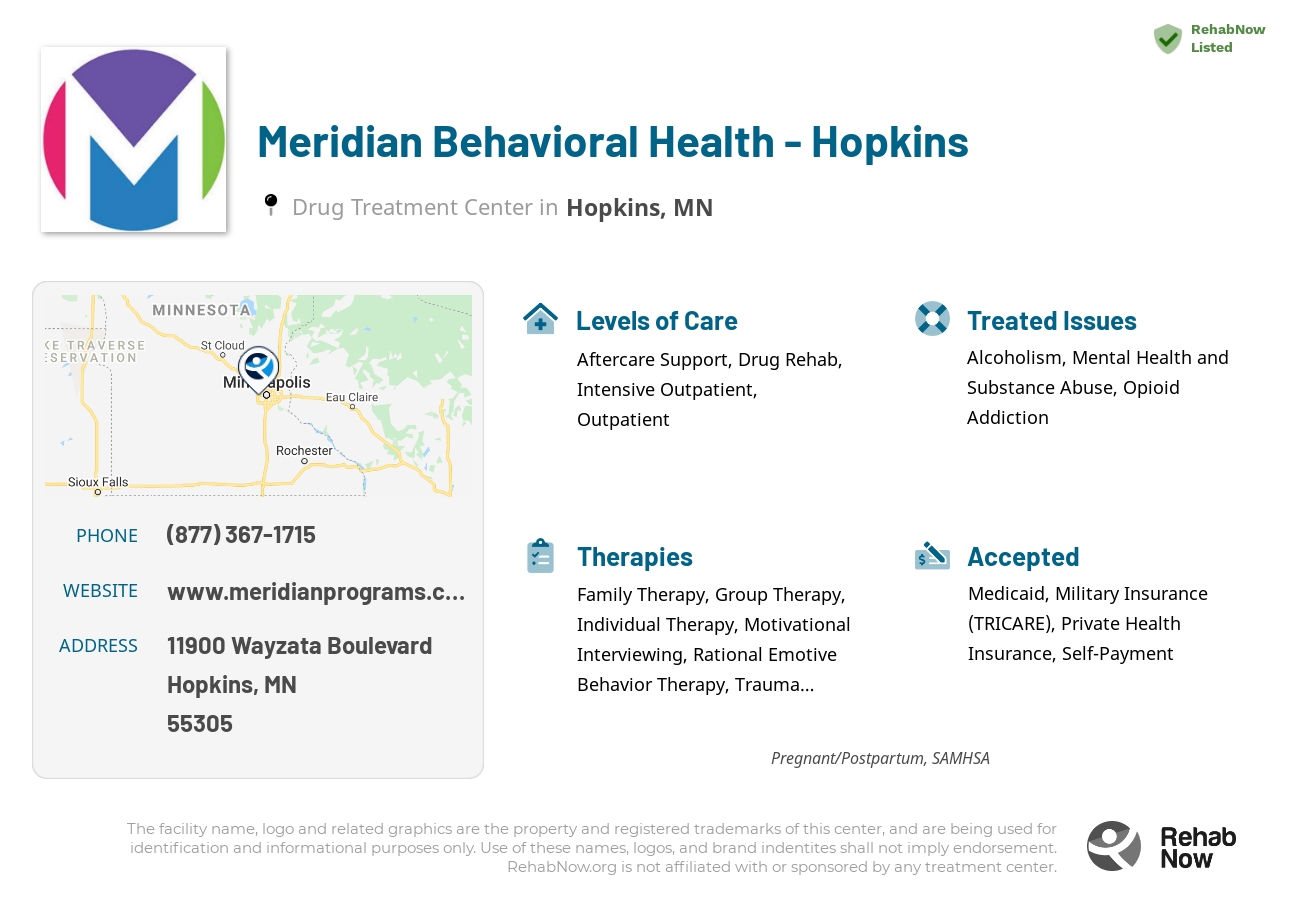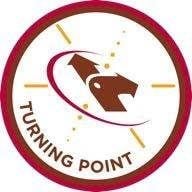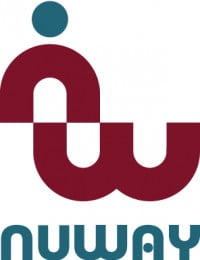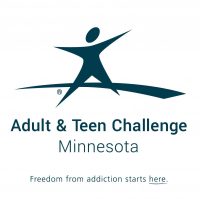Meridian Behavioral Health - Hopkins
Drug Rehab Center in Hopkins, Minnesota
Meridian Behavioral Health - Hopkins offers quality mental health, substance abuse, and addiction treatments with compassionate and individualized care, featuring evidence-based therapies, aftercare services, and extended care programs, and is nationally accredited and licensed by the Minnesota Department of Human Services.
About Meridian Behavioral Health - Hopkins in Minnesota
Meridian Behavioral Health - Hopkins is a recognized leader in providing quality mental health, substance abuse, and addiction treatments. Located in Hopkins, Minnesota, their dedicated team of professionals offers a wide range of service options to support clients in their journey to recovery and healthier lives. They focus on providing care that is compassionate and individualized, providing programs that are tailored to meet each client’s unique needs and goals for treatment.
Meridian Behavioral Health - Hopkins offers a variety of programs for helping individuals overcome addictions, from detoxification and medication management to aftercare services and intensive outpatient programming. They also provide individual, group, and family therapy to individuals struggling with addiction. Their evidence-based therapies are designed to help clients recognize and address the emotional and psychological barriers that contribute to addiction. Additionally, their extended care programs ensure that clients have long-term recovery support after they leave their facility.
Meridian Behavioral Health - Hopkins is proud to have both a state and national accreditation and is licensed by the Minnesota Department of Human Services. They are part of the National Association of Addiction Treatment Providers and have received numerous awards including the 2020 National Behavioral Health Quality Award. They are also dedicated to providing culturally-sensitive and inclusive care, offering language services and accepted insurance plans to their clients.
Genders
Ages
Modality
Additional
Accreditations
SAMHSA
Conditions and Issues Treated
Many people who struggle with opioid addiction need to attend specific programs like methadone , Suboxone or Vivitrol clinics.
These types of programs will provide the patient with legal, prescription medications that can help them overcome their cravings for illegal opioids like heroin or fentanyl . If the patient has a chronic condition like Hepatitis C, they must undergo treatment before they can begin taking these medications.
Levels of Care Offered
This center offers a variety of custom treatment tailored to individual recovery. Currently available are Aftercare Support, Drug Rehab, Intensive Outpatient, Outpatient, with additional therapies available as listed below.
An intensive outpatient program is usually the first phase of addiction treatment. It provides relief for those who are addicted, but are not ready to commit to an inpatient setting. Typically, the patient lives at home and is able to work or go to school. IOPs consist of a daily 3 to 5-hour program, and there is a required number of hours per week. Most patients go to IOP between 20 and 40 hours per week. The patient attends group counseling and individual therapy throughout the duration of treatment. They also meet daily with their therapist to discuss how it’s going and where they are in the recovery process.
The goal here is to teach patients healthy coping skills, such as stress management and identifying thoughts and behaviors that lead to relapse. The implementation of these skills will be useful as the individual transitions into the next phases of treatment.
An outpatient treatment program is set up to help with alcohol or drug addiction, or a co-occurring disorder. The patient must attend the Minnesota facility for their therapy and other programs but are able to return home each night. The frequency of mandatory attendance decreases after much of Meridian Behavioral Health - Hopkins‘s program is complete.
Aftercare is a term that’s used to refer to any sort of continuing care offered for a drug addict who has voluntarily entered a rehabilitation program. This type of care can be provided in several settings, including outpatient therapy sessions after the addict has completed an inpatient program. There are also 12-step support groups, such as Alcoholics Anonymous, which can provide additional help for addicts trying to stay sober.
Therapies & Programs
Individual Therapy is a critical component of addiction recovery. Therapists work with patients to identify the root of their addiction and figure out how to better handle the issues that led to them using drugs. Individual Therapy is the one-on-one session where people meet with their therapist. Individual therapy provides a safe space for people to open up and discuss personal and sensitive topics which they may not feel comfortable discussing in a group setting.
Family therapy will also help families realize that the addiction is not their fault. For many years, people blamed themselves for an addict’s behavior and felt that they had done something wrong. This is not the case. Addiction is a disease, and it can strike anyone, even if their life seems fine from the outside. It can bring a lot of shame to a family when they have an addict in their midst, but if everyone is open and honest with each other, then they can help everyone stay in recovery.
Group Therapy is utilized by drug treatment centers like Meridian Behavioral Health - Hopkins to provide the recovering drug addict with a platform to talk about their feelings and experiences. It also provides for an opportunity to learn from other addicts who have successfully overcome their addiction.
Group Therapy is employed in lectures, seminars, or discussion groups (the latter two are typically conducted as “therapy groups”). It is recommended that all group members be recovering addicts for this type of therapy to work (though it does not exclude others with lived experience).
Trauma therapy is a clinical process that helps individuals deal with mental stress often caused by traumatic events. It is generally done for children, teenage victims of sexual assault, and war veterans. The therapist helps the person identify, understand and work through the problem. This is done with the help of talking about it in group or one-on-one counseling sessions. Therapists use relaxation, role-playing, art, and music to help the person open up about what is bothering them.
Cognitive behavioral therapy is also a popular service for individuals living with addiction. This type of supportive treatment uses both one-on-one counseling and group sessions to teach addicts how to identify thoughts, behaviors and emotions that might increase their risk of relapse.
These professionals can help addicts develop coping skills for managing stress, improving self-esteem and overcoming triggers. They might also use behavioral therapy to help addicts learn how to avoid cravings and warning signs that could lead them back into addiction.
Therapy can be used as a step-down from inpatient treatment or as the primary method of overcoming an addiction. No matter which option is best for the addict, they will teach important emotional coping techniques, which can make it easier for addicts to get through the tough days.
(REBT) was developed by Dr. Albert Ellis in 1955. The therapy is based on the premise that our beliefs lead to and maintain our emotions and behaviors. Therefore, if a person has irrational thoughts, they will have an unhealthy emotional life. And as long as those irrational beliefs remain unchanged, they will continue to have unhealthy emotions and behaviors.
REBT is a purely psychological therapy, meaning it does not incorporate the use of medications or supplements. Instead, REBT focuses on helping people understand, respect, and accept their feelings without judgment, enabling them to have more control over their actions and behaviors.
The therapeutic process is straightforward: clients learn to identify the irrational beliefs that cause distress, challenge good coping statements, and replace them with healthy, rational beliefs.
Payment Options Accepted
For specific insurance or payment methods please contact us.
Is your insurance accepted?
Ask an expert, call (888) 674-0062
Meridian Behavioral Health Associated Centers
Discover treatment facilities under the same provider.
- Meridian Behavioral Health - Twin Town in Saint Paul, MN
- Meadow Creek - Pine City in Pine City, MN
- Meridian Behavioral Health - Cedar Ridge Men's Residential in Stillwater, MN
- Meridian Behavioral Health - New Brighton in New Brighton, MN
- New Beginnings - St. Anthony Park in Minneapolis, MN
Learn More About Meridian Behavioral Health Centers
Additional Details
Specifics, location, and helpful extra information.
Hopkins, Minnesota 55305 Phone Number(877) 367-1715 Meta DetailsUpdated November 25, 2023
Staff Verified
Meridian Behavioral Health - Hopkins Patient Reviews
There are no reviews yet. Be the first one to write one.
Hopkins, Minnesota Addiction Information
Minnesota is fighting an opioid epidemic that is leaving hundreds of its residents dead each year. Both prescription opioids and illicit opioids are widely abused in the Land of 10,000 Lakes. Heroin continues to be one of the most commonly abused drugs in the state, if not the most common illicit drug. Over 10% of all treatment admissions in Minnesota list heroin as their drug of choice.
In 2019, more than 30 people died from a drug overdose in Hopkins, Minnesota. About 9% of Adults in Hopkins are addicted to alcohol. This is thrice the times of car accidents and homicides. The top drugs that cause fatal overdoses are heroin, cocaine, fentanyl, and methadone. There are many different types of drug treatment available at Hopkins. Common types of treatment include inpatient, residential rehab, and outpatient treatment.
Treatment in Nearby Cities
- Monticello, MN (29.1 mi.)
- Hastings, MN (32.4 mi.)
- Morris, MN (128.5 mi.)
- Big Lake, MN (29.1 mi.)
- Duluth, MN (140.9 mi.)
Centers near Meridian Behavioral Health - Hopkins
The facility name, logo and brand are the property and registered trademarks of Meridian Behavioral Health - Hopkins, and are being used for identification and informational purposes only. Use of these names, logos and brands shall not imply endorsement. RehabNow.org is not affiliated with or sponsored by Meridian Behavioral Health - Hopkins.












